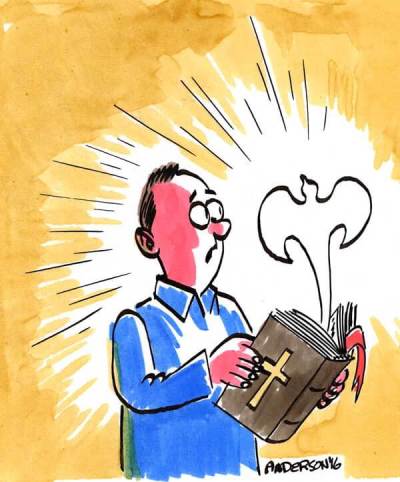5 Thoughts from the Doorway in the Book of Revelation

"Deep in our hearts, we know that the best things said come last," said Alan Alda in his memoir entitled Things I Overheard While Talking to Myself. He's right, of course. We chat for hours of an evening, asking for and receiving updates on mutual friends, alternately bragging on and complaining about our kids; and then "linger at the door with words that come with a rush from the heart. Doorways are where the truth is told."
In the Revelation, the Apostle John is standing at the door on every level as he writes his "famous last words." He was not expecting ever to leave his prison island of Patmos. He was the last of the surviving apostles, and in this recorded series of visions, he is being given a preview of last things, a glimpse through the doorway into "things which must shortly take place."
In the final days of 2017, I have read John's Revelation once again in a flying fast forward that left me wishing for more. A few years ago, the middle school Sunday School class I was teaching asked to study the Revelation, so I prepared lavishly, reading one chapter a week, revisiting it every day, sometimes in different versions. To be honest, even though I lingered over the chapters, consulted cross-references, notes and the odd commentary, I would not be eager to face a classroom full of middle school students, hungry for details about beasts and bowls and hard facts about the rapture, with nothing but my Bible and my study notes. I found The Revelation to be "deep weeds": deeply disturbing, but, at the same time deeply satisfying. At the risk of appearing to think (naively) that I have grasped the essence of the book or that any number of my bullet points could adequately capture the Apostle John's letter, I offer five thoughts gleaned from my five months of standing in the doorway with God's servant John.
1. The Revelation was written to people who knew their Old Testament a lot better than I do. The symbols and imagery that John uses, the numbers that repeat and resonate are all flaming arrows whose trajectories connect the dots to prophecies recorded in Ezekiel, Daniel, and elsewhere. The trick is that you have to recognize the arrow, hear its twang, in order to follow it. In the 404 verses that comprise John's final letter, there are 518 references to earlier Scripture — not quotes, but allusions. He doesn't say, "As it is written in Daniel's prophecy about the male goat . . ." when he takes up his pen to write chapter thirteen, but his audience, raised on Hebrew scripture, would have recognized the source of the imagery.
2. The Revelation was written by a pastor. I had the advantage of teaching a women's study on I, II, and III John during part of the time I was reading The Revelation, (which, now that I think of it, could have been called "IV John.") I was surprised to find common elements, because in all the fervor of interpretation and application of Jesus' message to the seven churches, it is easy to forget that he was writing a letter. We also forget that the letter was intended for actual communities of believers that existed in a certain geographic, economic, and cultural context. Far from a mere catalog of future events, John's role is to interpret what is to come in light of today's challenges, to throw in a dash of what has already been, and to help the flock know how to live in the present. Eugene Peterson defines the church as a group of "persons who dare to live by the great invisibles of grace, who accept forgiveness, who believe promises, who pray." The fact that some churches do these things more faithfully than others would have been front and center for John the pastor as he began penning Jesus' messages to the seven churches.
3. Listening can be a spiritual act.
"He who has an ear, let him hear what the Spirit says to the churches."
The rhythm of this phrase thrums through the messages to the seven churches no matter what their circumstances or individual besetting sins. Could selective hearing also be the root of my own failings? According to Annie Dillard, the greatest theological question of all times is this: "What in the Sam Hill is going on here anyway?" If she is correct, I may find the answer to that momentous question by opening my ears to what the Spirit is saying — through the Word, in response to my prayers, in the whisper-voice of my circumstances.
4. Worship is the ultimate goal when God reveals Himself to man. Twice John is rebuked for falling at the feet of a heavenly being in worship (19:10; 22:9). We, too, fall on our faces — easily and in the wrong direction. My journey through the Revelation reminds me that Jesus is the beginning and the ending, not only because He says so, but because the book literally puts his magnificence on display for twenty-two chapters, from beginning to end. When the letter is used as a reference book for our quibbling-matches about signs of the time and who's right about the rapture, we become more of what we already are: a distracted people. Truly a hymnal in its own way, the Revelation reminds me that whenever I find my way into worship, I am joining with and adding to the praise that goes on continually in heavenly places.
5. The God of Revelation invites. The word is "come," and the invitation goes out to all the thirsty. Through desert times of the soul, there is an invitation to drink freely. Here is comfort for the one who is tired of insincere offers; weary of eyes that scan the crowd in search of another, more interesting companion; fed up with promises made but not fulfilled. Come to Him who comes, for He has said that He is "coming quickly."
Michele Morin loves hot tea and well-crafted sentences, poems that stop her in her tracks and days at the ocean with the whole family. She laments Biblical illiteracy and advocates for the prudent use of "little minutes." She blogs at Living Our Days because "the way we live our days will be, after all, the way we live our lives." You can connect with her on Facebook, Twitter or Instagram.




























